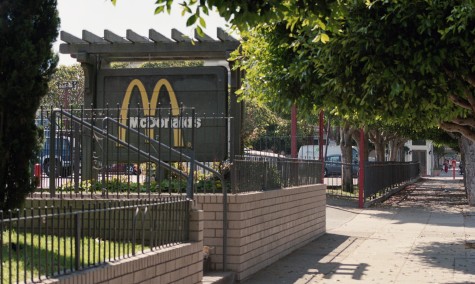Crime wave?

As almost anyone who’s ever walked down Haight Street knows, crime is pervasive in the area. Since the 60’s, it’s not only been a mecca for New Age pilgrims, but also one of the world’s foremost open-air drug markets. n fact, the crime map on the San Francisco Police Department’s website places 205 instances of drug and disturbing the peace violations within one mile of Urban since Aug. 1.
In a landmark victory for criminal justice reform, the people of California passed Proposition 47 in November 2014 by a landslide of 60 percent. Proposition 47 reduces the penalties from felonies to misdemeanors for these crimes if the resulting damages are under $950: petty theft, receiving stolen property, check fraud, and vandalism. It also reduces the penalties for drug possession with the intention of personal use. The money saved with this program will be used in mental health and youth drug prevention programs across the state. Aside from relieving an exhausted prison system and budget, as written about in the Los Angeles Times in February 2015, lawmakers hope this bill will end a vicious cycle of crime, poverty, and addiction that so many, especially in the Haight suffer from.
Proposition 47 was hailed as the beginning of a new era of progressive criminal justice reform, but it also brought unintended consequences. Proposition 47 not only reduces future sentencing, but applies retroactively as well. This means that those currently in prison for crimes that are now misdemeanors can apply to have their sentence commuted. As of August, The Sacramento Bee newspaper reported that 4,347 prisoners were released and, after completing one year of mandatory parole, they will be free to once again rejoin the populace as civilians.
However, the “crime/poverty cycle theory”, accepted by the Office of National Drug Control Policy, means this is a lot more difficult than it sounds. According to this theory, inmates, upon release, will often find it nearly impossible to get a job, a place to live, or any sort of safety net with a criminal record. Meanwhile, they must comply with stringent parole requirements that could land them in prison for something as simple as having a conversation with someone with a criminal record, according to the text of the bill.
Statistics from the Los Angeles Times show that after the implementation of Proposition 47, there was a drop in petty crime, simply because of the decriminalization of these crimes that it entails; but, there was actually a spike in more serious felony property crime. Property crime includes crimes such as arson, burglary, theft, motor vehicle theft, vandalism, shoplifting, and robbery with damages over $950. According to Kron 4, a San Francisco local broadcast news station, in January through June 2014, there were 22,700 instances of property crime, and in the same period in 2015 there were 27,707 instances. That is a 22 percent overall increase, with a sharp 47 percent increase in theft from vehicles, 17 percent increase in auto theft, and a 9 percent increase in other theft. San Francisco Police Chief Greg Suhr described this as “a tremendous increase in property crime”.
Prinlinger, an SFPD officer whose beat includes Haight St, was concerned about the way Proposition 47 changes crime incentives. “Because the punishment has changed,” she said, “that might be having an effect on how people either choose to continue doing crimes or not”. Prinlinger was also worried about those people whose only safety net is the prison system: “Sometimes a secondary benefit of being put in jail is basically you’re not allowed to be as self-destructive as you might be if you were out in the street, say, dealing with a substance abuse issue.”
Prinlinger said that many merchants, particularly on Haight Street, are upset with the effect Proposition 47 has on enforcement, particularly with sign-release arrests. “With a sign-release arrest,” she explains, “if I detain someone in the commission of a crime under Proposition 47 … instead of putting them in handcuffs and taking them to jail where they’d wait to be arraigned, now instead I issue them a citation so at the very same time they’re free to go”. She says that “there’s a court date that’s issued to them for a misdemeanor, but that’s presuming that they’ll show up”.
Proposition 47 is still in its infancy, and only time will reveal its effects on not only the neighborhood around Urban, but on the city and state as well. As of yet, there is no verified causational relationship between Proposition 47 and the rise in property crime. There is also mixed data as to whether Proposition 47 reduces recidivism rates or meaningfully reduces petty crime.











